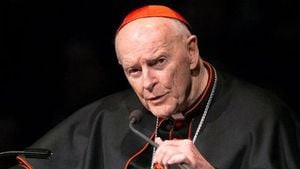On April 4, 2025, Jerome Powell, the president of the Federal Reserve, delivered a stark warning regarding the economic implications of tariffs imposed by former President Donald Trump. Speaking in Arlington, Virginia, Powell stated that the tariffs on imported goods are likely to be significantly more extensive than previously anticipated, raising concerns about the future of the U.S. economy.
During his first public address since Trump’s recent tariff announcements, Powell emphasized that the economic consequences could be severe. He noted, "It is becoming clear that taxes on imported products will be significantly more extensive than anticipated," adding that the expected economic fallout includes "higher inflation and slowed growth." This warning comes at a time when the financial markets are reacting negatively to the uncertainty surrounding these tariffs.
Minutes before Powell's speech, Trump took to his social media platform, Truth Social, urging the Fed chair to lower interest rates, claiming that there had been significant progress on inflation since his return to power in January 2025. Trump proclaimed, "This would be the perfect moment for the president of the Fed, Jerome Powell, to reduce interest rates." He cited decreasing energy prices and a notable 69% drop in egg prices as indicators of an improving economy.
However, Powell responded cautiously, stating, "It is too early to say what the appropriate monetary policy is," indicating that he is not inclined to adjust interest rates in the current volatile environment. He elaborated on the potential impact of the raised tariffs, asserting that they will likely contribute to increased inflation in the coming quarters.
Powell's remarks come amid a backdrop of rising economic uncertainty, with Wall Street experiencing a significant downturn following his comments. By 15:25 UTC, the Dow Jones Industrial Average had dropped by 3.39%, the Nasdaq fell by 3.81%, and the S&P 500 declined by 3.90%. Both the S&P 500 and Nasdaq fell below the 4% mark, and Wall Street plunged nearly 6% by the close of trading, reflecting investor anxiety over the economic outlook.
In a question-and-answer session following his speech, Powell expressed hope that the uncertainty surrounding the tariffs and their economic impact would diminish over time. He stated, "Uncertainty should be much less elevated in one year," suggesting that clearer economic indicators might emerge as the situation develops.
When asked about his position at the helm of the Federal Reserve, Powell affirmed his commitment to complete his term, which is set to end in May 2026. His assurance comes at a time when the Fed's policies are under intense scrutiny, particularly in light of the current economic challenges.
The implications of Trump's tariff policies are not only impacting the U.S. economy but are also sending shockwaves through global markets. Analysts warn that the tariffs could lead to a domino effect, affecting international trade dynamics and potentially leading to retaliatory measures from other countries, particularly China.
As the situation unfolds, businesses in the U.S. and abroad are bracing for the economic consequences of these tariffs. Many companies are reevaluating their supply chains and pricing strategies in response to the increased costs associated with imported goods. The automotive industry, for instance, is already reporting pauses in production and price hikes as they navigate the new tariff landscape.
In Canada, the economic repercussions are also being felt, with Statistics Canada reporting job losses for the first time in three years, a situation attributed to the uncertainties stemming from U.S. trade policies. This highlights the interconnectedness of the North American economies and the potential for a broader economic downturn if the trade tensions escalate.
Powell's warning about the risks of higher inflation and increased unemployment resonates with many economists who fear that the combination of tariffs and rising costs could stifle economic growth. The Fed's challenge will be to navigate these turbulent waters while maintaining a stable economic environment.
In summary, Jerome Powell's recent statements underscore the precarious state of the U.S. economy in the face of Trump's tariff policies. With higher inflation, slowed growth, and increased unemployment on the horizon, the Federal Reserve is poised to face significant challenges in the coming months. Investors and policymakers alike will be watching closely to see how these developments unfold and what measures will be taken to mitigate the potential fallout.




